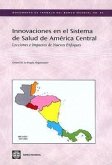Poor health in Sub-Saharan Africa has immense economic consequences. Besides the high mortality and disease rates and the pain and suffering it causes, poor health robs the continent of human capital, reduces returns to learning, impedes entrepreneurial activities, and restricts economic growth. This study argues that despite financial constraints, significant improvements are possible in many countries, as has been seen in Benin, Botswana, Kenya, Mauritius, and Zimbabwe. The book also presents positive ideas on how to make these improvements. 'Better Health in Africa' documents lessons learned and best practices in four major areas. 1. African households and communities need the knowledge and resources to recognize and respond effectively to health problems. Threats to health should be made known and countered through public and private services. 2. Human and financial resources must be used more productively by reforming health care systems. Correcting sources of waste and inefficiency must take top priority. 3. Cost-effective packages of basic health services can do much to meet the needs of households and reduce the burden of disease. Networks of local health centers and small hospitals in rural and periurban areas can facilitate delivery. 4. Additonal funds totaling $1.6 billion a year can help those living in Africa's low-income areas obtain basic health services. Cost-sharing can make an important contribution to health equity and the sustainability of health services. The report emphasizes that no government should delay committing itself to the task, although progress toward better health will vary from country to country and no single formula will apply to all. 'Better Health in Africa' presents action plans and yardsticks for measuring progress. The idea of the core, cost-effective package of health services complements 'World Development Report 1993: Investing in Health' with an operationally oriented perspective on health services. The report also reflects the views of organizations such as the World Health Organization and UNICEF that will work together in helping African countries adapt and implement the report's recommendations.
Hinweis: Dieser Artikel kann nur an eine deutsche Lieferadresse ausgeliefert werden.
Hinweis: Dieser Artikel kann nur an eine deutsche Lieferadresse ausgeliefert werden.







